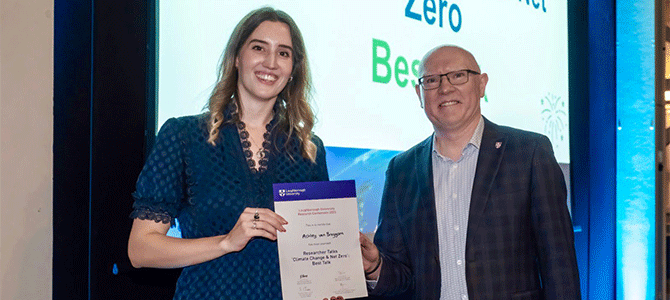15 Jan 2024
AACME doctoral researchers win top prizes at the Loughborough University Researcher Conference 2023

We’re thrilled to announce that 2 doctoral researchers from the School of Aeronautical, Automotive, Chemical and Materials Engineering have won awards at the recent Loughborough University Researcher Conference 2023.
The conference, held in December 2023, was themed ‘Transforming our tomorrow. Together’, provided our doctoral researchers an opportunity to network with one another and learn more about the extensive range of research conducted across the University.
Both our doctoral researchers, Huyen Le and Ashley van Bruygom, won awards in the Researcher Talk Competition.
Huyen Le, Department of Materials, won the ‘Highly Commended’ prize in Sport, Health and Wellbeing for her research titled ‘From Deadly Surfaces to Sustainable Solutions: The Power of Watching Paint Dry!’ and Ashley van Bruygom, Department of Aeronautical and Automotive Engineering, won the ‘Best Talk’ prize in Climate Change and Net Zero for her research ‘Hydrogen for the future of aviation’.
Read more about their research below.
An overview of Huyen’s research
For the first time in recent history, we must come to terms with the fact that not all bacterial infections are treatable anymore - with implications for all areas of medicine. My talk briefly highlights how engineering research contributes to the creation of personalised healthcare solutions. Our group is working on creating surfaces that can kill bacteria before they can grow and spread.
Specific insights into Dr Nacho Martin-Fabiani group’s experimental work of using nanomaterials to create antimicrobial surfaces was discussed. Promising preliminary results were compared to established computational data about colloid science. The scientific knowledge from my PhD offers new ways to contribute to the improvement of healthcare delivery in hospitals. Preventing the transmission of diseases by improving hygiene of frequently touched surfaces, we can reduce overprescription of medicine, which reduces the incorrect overuse of antibiotics and de-accelerate the antimicrobial resistance crisis.
An overview of Ashley’s research
Global air traffic is expected to increase substantially over the next 30 years. In order to meet industry and government commitments to reduce the impact of climate change, engine emissions must be reduced. Alternative fuels, such as hydrogen, have been suggested as a solution to this problem, however these are immature technologies and significant research and development is required before they are ready for service. Hydrogen is fundamentally different to what the industry is accustomed to using; as a gas rather than a liquid, hydrogen has vastly different physical characteristics that must be considered. At the National Centre for Combustion and Aerothermal Technology (NCCAT) both experimental and computational work is being undertaken in collaboration with government and industry to develop hydrogen combustion for flight. This presentation will highlight the complexities of computer simulations of hydrogen. By improving methods, these simulations can better our understanding of hydrogen flame behaviour; and can even aid in the design of future jet engine injectors. One of the biggest issues with these types of simulation is that they require a huge amount of computational resource. High-Performance Computing systems are required so that simulations can be completed in a greatly reduced amount of time which is vital for remaining at the forefront of this type of research.
